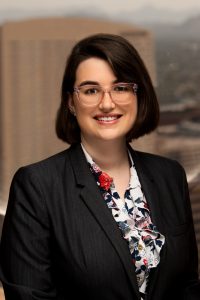

Lindke v. Freed & O’Connor-Ratcliff v. Garnier
United States Supreme Court
March 15, 2024
JSH Attorneys: Ashley Caballero-Daltrey, Justin Ackerman
In two opinions last week, the United States Supreme Court clarified the test for when a public official’s social media activity constitutes state action under 42 U.S.C. § 1983. The Court held that social media activity constitutes a state action only if the official “possessed actual authority to speak on the State’s behalf” and “purported to exercise that authority when he spoke on social media.”
In Lindke, James Freed, a city manager, operated a Facebook public page where he posted a mix of personal information and city-related news. His Facebook page predated his appointment as city manager. During the pandemic, and while Freed was city manager, Kevin Lindke commented on Freed’s page to discuss his dissatisfaction with the city’s response to the pandemic. Freed initially deleted Lindke’s comments but ultimately blocked him, which prevented Lindke from commenting on the posts but allowed him to see them.
Lindke sued under § 1983, alleging that Freed violated his Frist Amendment rights. The district court granted summary judgment to Freed because he was not acting in a pubic capacity. The Sixth Circuit affirmed, applying a test that examined whether the official was performing an actual or apparent duty or if he could not have acted without the authority of his office.
The Supreme Court granted certiorari. It explained that the Sixth Circuit’s approach differed from the approach in the Second and Ninth Circuits, which examined the account’s appearance and whether the content looked official.
The Court first reviewed its precedent regarding the state action doctrine and the requirement that a § 1983 claim be against a person who acts “under color of state law.” It noted that the under color of state law and state action requirements are identical and that there is ample case law establishing and reinforcing the state action requirement. And although state action is normally easy to spot, the Court discussed cases where the line between private conduct and state action was difficult to draw.
Based on its precedent, the Court explained that the “distinction between private conduct and state action turns on substance, not labels” and that, accordingly, courts must take a close look and examine the individual facts of a case to determine whether the activity constitutes state action. It concluded that in the context of social media, the activity is only state action if the official “(1) possessed actual authority to speak on the State’s behalf, and (2) purported to exercise that authority when he spoke on social media.” And although appearance and function of the social-media activity can be relevant to the second step, those things cannot make up for a lack of state authority in the first step.
For the first prong, the Court explained that should look at statutes, ordinances, regulations, customs, or usage to determine whether a state official has power. For a defendant like Freed, the Court stated that he would have to have actual authority “rooted in written law or longstanding custom to speak for the state.” The Court also iterated that misuses of power are actionable (such as an arrest made with excessive force) because the state official necessarily possessed power in order to misuse it.
For the second prong, the Court explained that a state official generally only purports to speak on behalf of the state when speaking in an official capacity or fulfilling responsibilities pursuant to state law. The Court made it clear that an official cannot insulate government business by conducting it on a personal page, but if a page is “personal,” a court can safely presume that the speech is personal absent evidence to the contrary.
The Court did not resolve the issue of whether Freed’s posts constituted state activity, but explained that the posts could have been “mixed use,” with both personal and official posts. The Court cautioned that nature of the technology involved also matters to the analysis. For example, deleted comments implicate only the post where the comments were deleted. But blocking a commenter could potentially block them from both the official and personal posts and expose an official to greater liability. The Court vacated the Sixth Circuit’s judgment to the extent that its analysis differed from the Court’s opinion and remanded the case to apply the proper analysis.
In O’Connor-Ratcliff, a per curiam opinion, the Court vacated a Ninth Circuit opinion on a similar issue. There, members of a school district board of trustees retained their Facebook pages after their elections. They described themselves as “Government Officials” on their pages. Parents of children in the district commented with lengthy and repetitive comments to the Trustees’ social media posts. The Trustees initially deleted the comments and then blocked the commenters. The Ninth Circuit held that there was a “close nexus” between the Trustees’ use of their social media and their official positions. The Supreme Court explained that test was not the one articulated in Lindke and remanded the case so that the court could apply the proper analysis.
Ashley Caballero-Daltrey is part of the firm’s appellate team where she represents clients in federal and state appellate matters and dispositive motions. Before joining JSH, Ashley worked as a law clerk for Vice Chief Justice Ann Scott Timmer of the Arizona Supreme Court. She focuses her practice on municipal law, personal injury, bad faith, and premises liability. Ashley has published articles and spoken on appellate issues including appeals for grazing permits on public lands, unique citation issues, and special action procedures.
adaltrey@jshfirm.com | 602.263.4489 | jshfirm.com/adaltrey
Justin Ackerman represents clients in federal and state appellate matters in cases involving excessive force, wrongful death, personal injury, bad faith, and premises liability. After graduating as the valedictorian of his class from Phoenix School of Law, Justin worked as a law clerk for the Hon. Michael J. Brown in Division One of the Arizona Court of Appeals. Following his clerkship, Justin has handled over 75 appeals, successfully arguing before the Arizona Court of Appeals, Arizona Supreme Court, and U.S. Court of Appeals for the Ninth Circuit. Justin has spoken at many seminars on appellate preservation topics and is recognized as a Southwest Super Lawyers Rising Star and Best Lawyers Ones to Watch in the area of Appellate Practice. He currently serves as the Chair of the Appellate Group at JSH.
jackerman@jshfirm.com | 602.263.4552 | jshfirm.com/jackerman